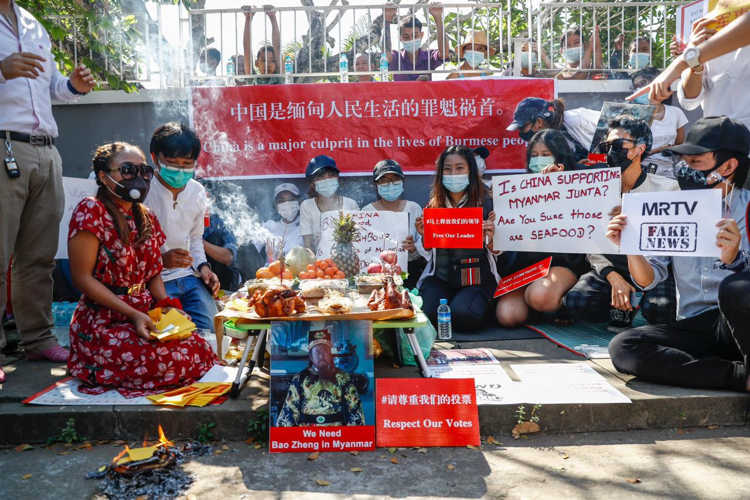China has added one more country to the growing list of those that stand antagonised with it. Now protesters in Myanmar accuse China of supporting generals who have mounted a coup toppling the newly-elected government of Aung San Suu Kyi.
This Thursday, anti-coup protesters gathered outside the Chinese embassy in Yangon, Myanmar's former capital and financial powerhouse, to protest against what they called China's support to the generals. Protestors alleged that China is interfering in the running of a democratic and peace-loving country.
Defying the military, the people held banners in English and Chinese denouncing China. A placard read: "Support Myanmar, Don't support dictators." Another one said: "Support our democracy."

Yet another banner said: "Networking technicians leave now," in apparent reference to online allegations that China was sending planes with IT personnel and equipment to help the junta control the internet and impose news blackouts.
A Channel News Asia report said that the Chinese embassy refuted allegations that China was sending technical people to support the coup. It quoted a statement put by the Chinese embassy on Facebook saying that the flights were regular cargo ones importing seafood.
However, Chinese Foreign Ministry spokesperson Wang Wenbin told a media briefing in the Chinese capital Beijing that, "there have been false information and rumours about China on issues relating to Myanmar, which can serve as a reminder that one should not be too credulous of similar claims."

The Myanmar military, led by General Aung Hlaing, overthrew the democratically elected government of the National League for Democracy (NLD), led by Suu Kyi, and detained several political leaders and activists. Using the pretext of voter fraud in the elections, the military staged the coup on the day the parliament was to begin its new session. Gen Hlaing has imposed an emergency for one year.
The coup has derailed the fledgling democracy in the South East Asian country and has come in for widespread condemnation. The Western nations want to impose sanctions on the country but China blocked a UN Security Council statement condemning the military antics. Shades of a "colour revolution," seen in other parts of the world have also now emerged with Myanmar demonstrators adding to their clothing a red ribbon—the colour of Aung San Suu Kyi's ousted ruling party, the NLD, during the protests.

Social media giant Facebook has also jumped in the fray saying it would reduce the distribution of the content and profiles of the generals because they "continued to spread misinformation" after the coup. The measures—which are not a ban, but are aimed at reducing the number of people who see the content—will apply to an official page run by the army and one by a spokesperson, the company said in a statement, as well as "any additional pages that the military controls that repeatedly violate our misinformation policies," Nikkei Asia reported.
The pages will also not appear on news feeds as "recommended." Facebook said it had also suspended the ability for Myanmar government agencies to send content-removal requests to the company through the normal channels used by authorities across the world.
Facebook's move comes as the military government proposes a cybersecurity bill that would give the state sweeping powers to police the internet, the daily reported.




















